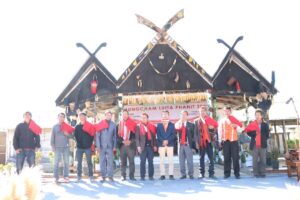Luita Phanit – the seed sowing festival of Phungcham is being celebrated under the theme “Ngashan Hi Lanna” (Our Culture Is Our Wealth). Every year, the Chief of Phungcham on February 14 prepared and shared food platters in his courtyard and the public on February 15 for anyone to come and dine.
TFM Ukhrul Correspondent
Luita Phanit, the most important festival of Phungcham is being celebrated grandly. The glorious festival that kickstarted on February 14 will wind up on February 17.
Thanngam Vashum on behalf of his father Khashim Vashum attended the opening ceremony as Cheif Guest of the inaugural function and Reileiso Longleng as guest of honour.
Speaking at the occassion. Thanngam Vashum stated that his father Khashim Vashum could not attend the festival because of the enforcement of model code of conduct. While conveying the greetings of his family read out the message of his father MLA Khashim Vashum “Mount Longthan at Phungcham is the dispersing point of Tangkhuls. May the bad things take flight and good things come in. May the Creator blessed with bountiful harvest. May the children of Phungcham prosper in every way and wish everyone a prosperous year ahead.”

Guest of honour, Reileiso Longleng stated “Luita Phanit is a time to ask the Creator for manifold blessings. On this very day, I also remembered Dr. M. Horam native of this village and former HAC Chairman who propounded the idea of Lui-Ngai-Ni, the seed sowing festival of the Nagas.
“Phungcham is considered as one of the oldest village of Tangkhul. Let us preserve our culture and identity. Let us contribute and promote Phungcham to a greater height. Let us develop ourselves as a community. No amount of developmental activities by the Government will develop Phungcham. May this Luita Phanit bring us closer and look forward to a new glorious path.”
Luita Phanit is celebrated before ploughing and preparing the soil for the seeds to be sown. It is an important festival for the northern Tangkhul community. There is no specific date for this festival.”
Some villages of northern Tangkhul celebrated Luita Phanit as early as January end and some villages celebrated as late as middle of February.
‘Hokharai’ a traditional chanted by the village chief invoking the blessings of the ‘Kasa Khava’ (creator) for good harvest, followed by his wife digging the soil and sowing the first seeds, symbolically declaring that the villagers can enter and start toiling in their field marks Luita Phanit.
Luita Phanit is one of the most expensive traditional festivals of Raphei. During the festival, the community make the finest ‘khor’, a traditional drinks made from the finest grains and cooked the best ‘Raphei Hoksa’ a delicious pork dish of the area and offer to their neighbours and visitors. In some villages, there is a practice of laying table of food in the courtyard for anyone to come and dine, which is done at a fix time.
In the past, the festival is considered as sacred, however today it is celebrated as a reflection on the ideas, customs and social practices of our forefathers. Some of the ways or practices by the ancestors may be authoritative and may not carry scientific explanation but it was a way of their life.
In the olden days, Luita Phanit offered a sense of belonging for spiritual, religious, social or geographical groups, contributing to group solidarity. In contrast with the past, an active participation of diverse people can be witnessed in the festival as social events which have positive and negative cultural, social, economic and environmental impact on the community.
Cultural festivals are the symbol of synergy, cooperation and team work. Planning and conducting cultural festivals involving members of the community yield a number of personal and social benefits to individuals and communities. Participation in social events provides positive psychological states including better self-regard, a sense of belonging, and a purpose in life for those who participate. The festivals provide members of the community with opportunities to engage in socialisation, entertainment and the establishment of social networks, thus contributing to the enhancement of community solidarity.
Raphei (northern Tangkhul area) is also known as the lands of festivals. People of the area have Luita Phanit, Yarra (youth festival) Shomkhap Phanit (festival celebrated after transplantation of paddy) Chumphu Phanit (post harvest festival) and Dhar-reo Phanit (harvest festival). In addition, there is the Shirui Lily festival. It is time to promote the rich culture but to do that people also need to generate awareness and create a policy to promote and preserve the culture and identity. Simply organising festivals without introspection and understanding the reason for the celebration can be fatal.
